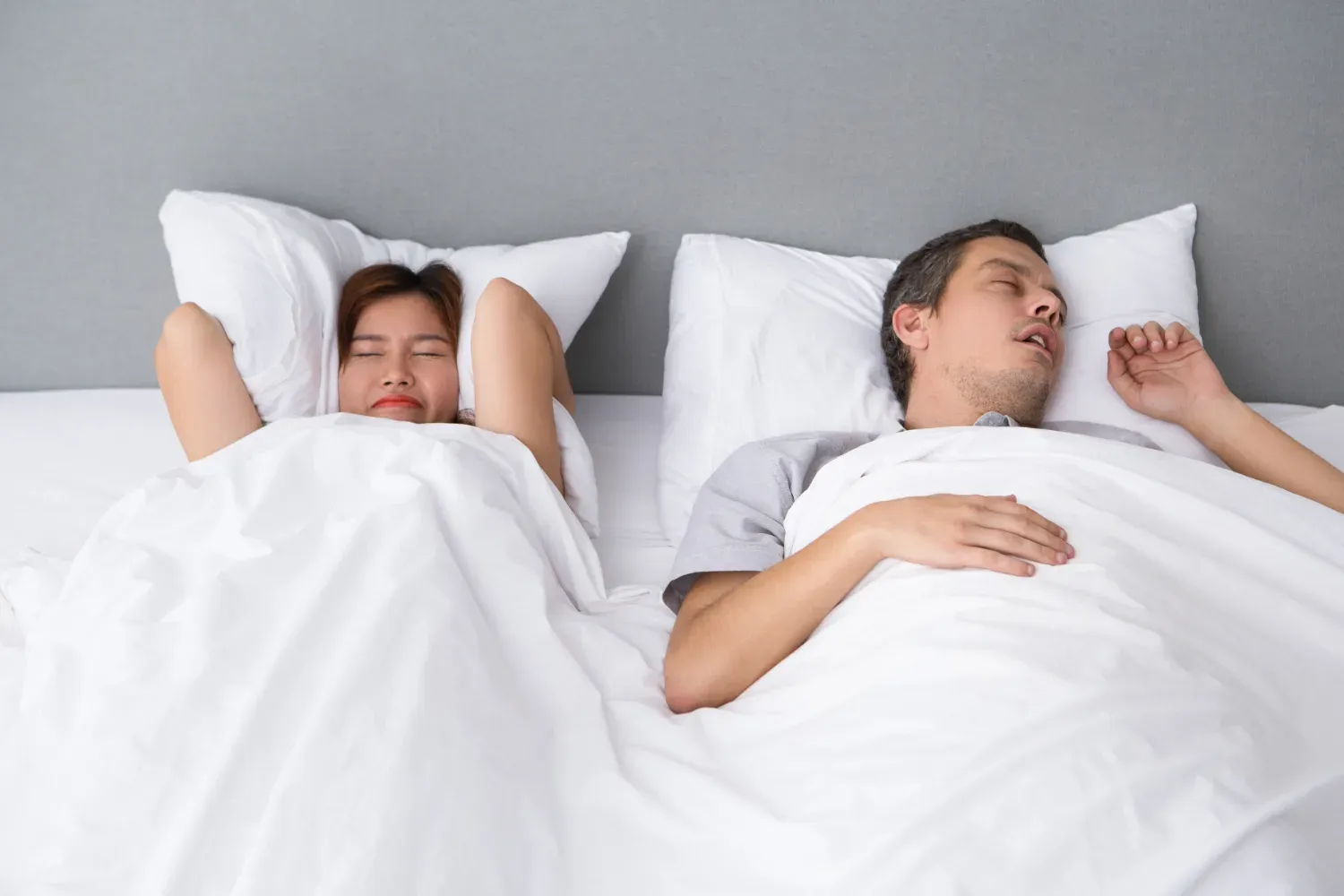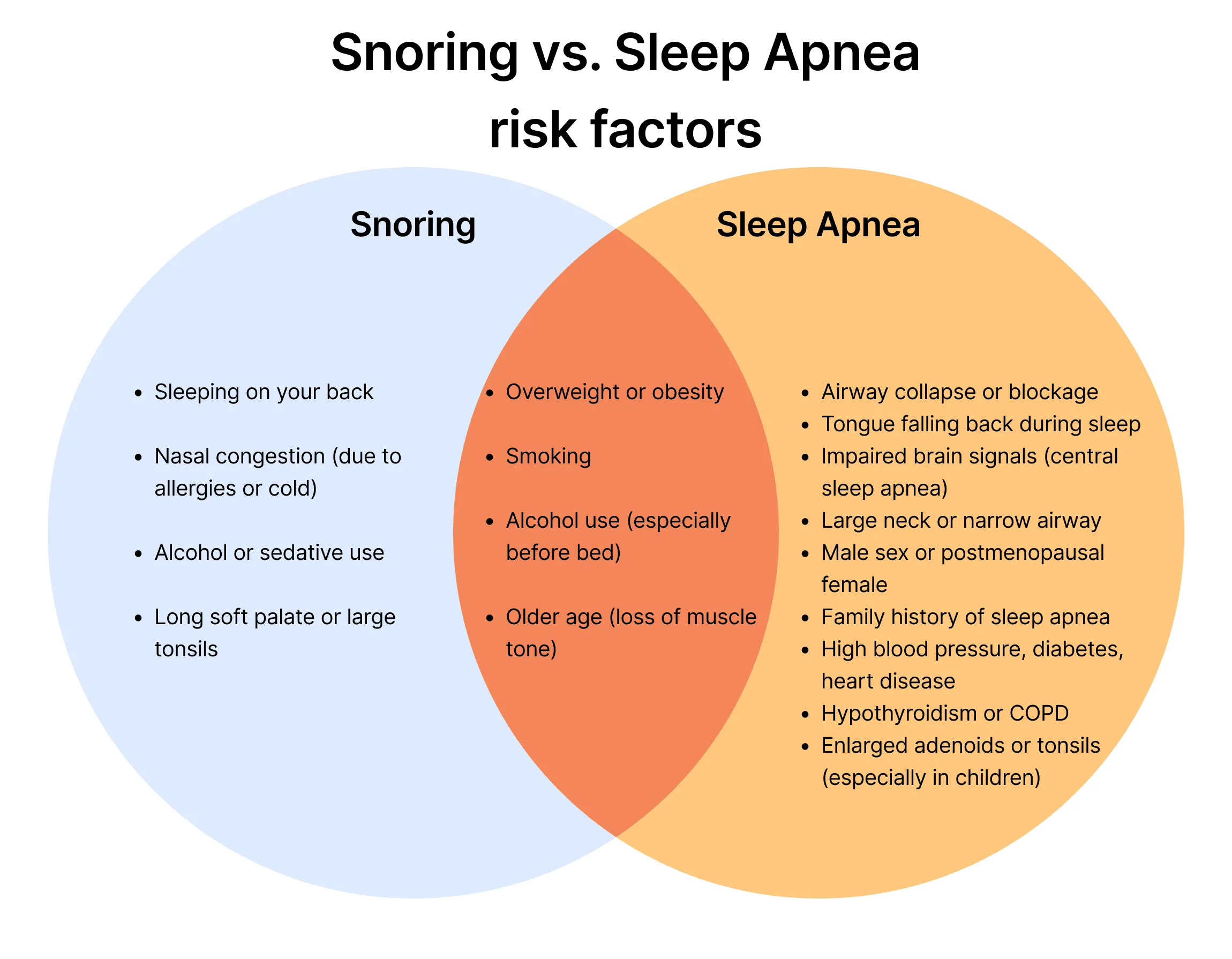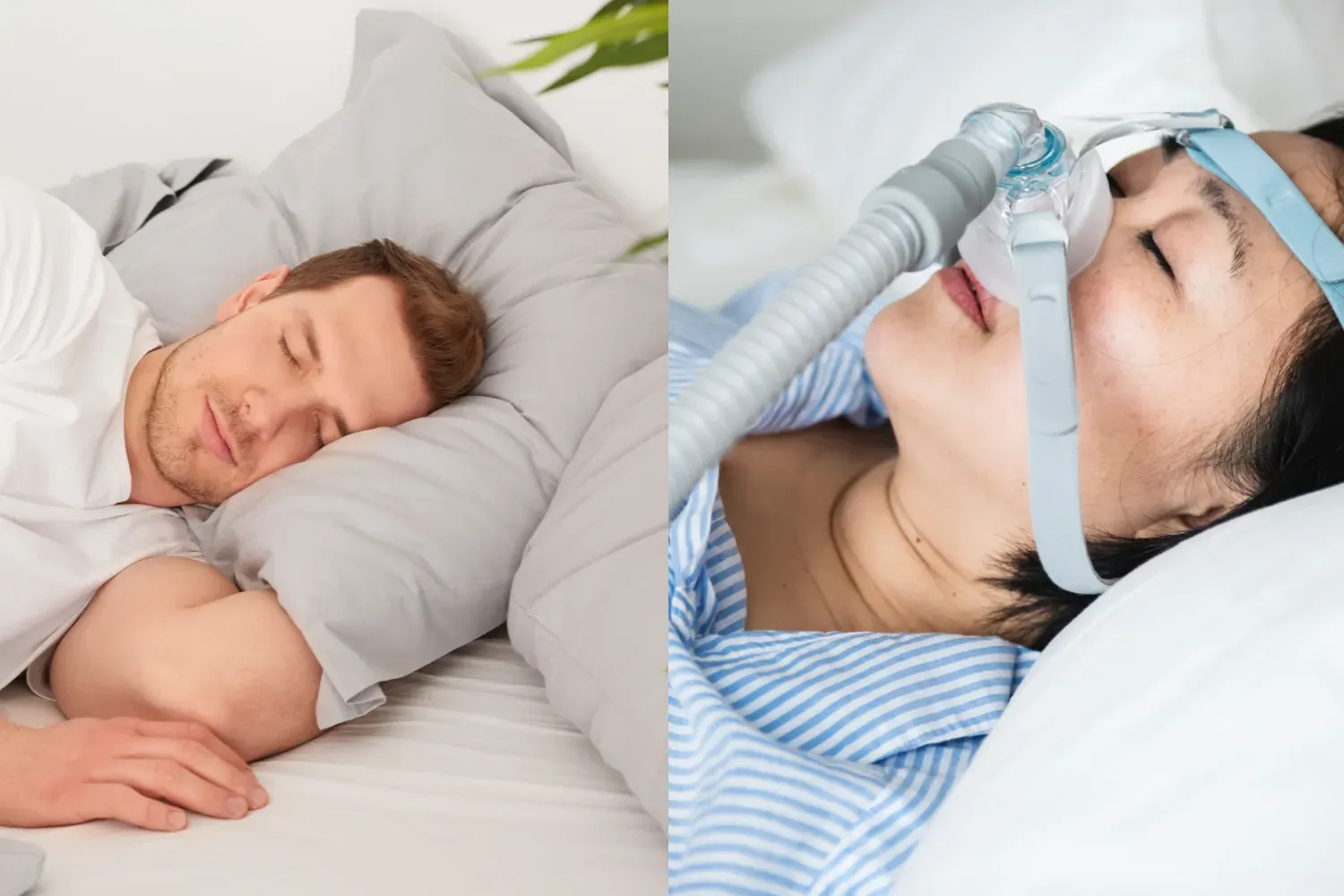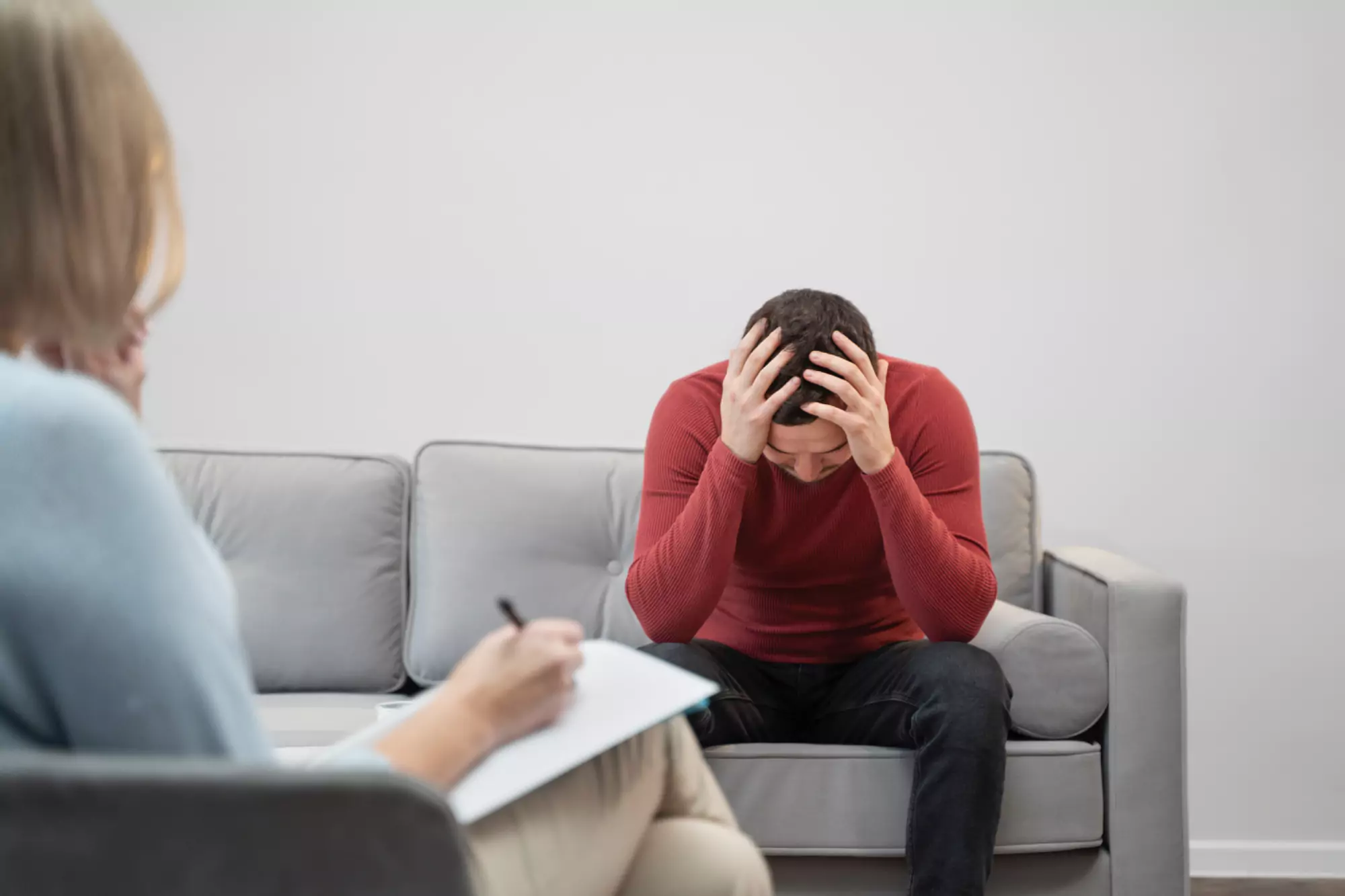Sleep Apnea vs. Snoring: What’s the Real Difference?

Have you ever been kept awake by someone snoring, or perhaps you've been the one making the noise? It's easy to dismiss snoring as a minor annoyance, but what if it’s actually a sign of something more serious?
Although snoring is typically not serious, it can sometimes indicate sleep apnea, a condition that can disturb your sleep and affect your well-being. Unfortunately, many people confuse snoring with sleep apnea, which makes it harder to tell when it’s time to seek help.
In this blog, we’ll break down the key differences between snoring and sleep apnea, so you can get a good night’s sleep. Let’s get into details!
Snoring vs. sleep apnea
What is snoring?
Snoring is that noisy, sometimes annoying sound someone makes when sleeping. It happens when air flows past relaxed tissues in your throat, causing them to vibrate. This produces a sound that can sometimes be soft and gentle, and other times loud enough to drive your bed partner to the couch.
For most people, snoring is harmless and more of an annoyance than a health concern. In fact, around 45% of adults snore now and then, and roughly 25% are habitual snorers.
But in some cases, snoring can be a warning sign of sleep apnea. And that’s when it’s worth paying closer attention.
What is sleep apnea?
Sleep apnea occurs when your breathing stops and starts repeatedly during sleep. These pauses, called apneas, occur due to partial or complete blockage in the upper airways. Each pause in breathing can last for 10 seconds or more and can happen multiple times an hour.
Because of these constant interruptions, you might wake up feeling like you never really slept, even after a full night. It also lowers the oxygen levels in your blood, which can stress your heart and other organs. As a result, you might feel tired during the day, struggle with focus, or find it hard to do daily tasks.
Unlike snoring, sleep apnea is a serious health issue. And if left untreated, it may lead to:
-
High blood pressure
-
Heart disease
-
Stroke
-
Type 2 diabetes
-
Cognitive issues like poor memory and concentration

Sleep apnea vs. Snoring: Key Differences
Now you might be wondering, how do I know if I have sleep apnea or just snoring? It can be tough to figure out, but don't worry! Here's a simple comparison to help you spot the difference:
| Feature | Snoring | Sleep Apnea |
|---|---|---|
| Breathing interruptions | No, breathing is continuous | Yes, breathing stops or is very shallow repeatedly |
| Oxygen levels | Usually normal | Drops during apneas |
| Sleep quality | Usually normal, though can be disturbed | Fragmented, poor-quality sleep |
| Daytime symptoms | Usually none or mild | Excessive sleepiness, fatigue, headaches |
| Loudness | Can be loud and annoying | Often loud, with gasping or choking sounds |
| Health risks | Mostly social and minor sleep disruption | Increased risk of cardiovascular and metabolic diseases |
Sleep apnea vs. snoring symptoms
Snoring can be a symptom of sleep apnea, but does snoring always mean you have sleep apnea? The answer is no. If your snoring comes with any of the following signs, it could be an indication of sleep apnea:
-
Loud snoring with pauses, gasping, or choking
-
Frequent waking (even if you don’t remember)
-
Daytime exhaustion, brain fog, and mood swings
-
Morning headaches and dry mouth
-
Irritability or mood swings
-
Loss of libido or energy
-
High blood pressure
-
Obesity
Sleep apnea vs. snoring: Causes
Snoring usually happens when the air passes through a relaxed airway and causes the throat tissues to vibrate. This can occur if you:
-
Sleep on your back
-
Have nasal congestion due to allergies or a cold
-
Drink alcohol or take sedatives
-
Have a long soft palate or large tonsils
Sleep apnea, on the other hand, is caused by more serious issues and occurs when:
-
The airway collapses or becomes blocked
-
The tongue falls back, obstructing the airway during sleep
-
The brain doesn’t send proper signals to breathe (in central sleep apnea)
Sleep apnea vs. snoring: Risk factors
Although snoring and sleep apnea share some risk factors, there are a few that are more strongly linked to sleep apnea. You’re more likely to have either condition if you:
-
Are overweight or obese
-
Smoke
-
Drink alcohol (especially before bed)
-
Are older (muscles lose tone with age)
But the risk for sleep apnea increases if you also:
-
Have a large neck or narrow airway
-
Are male or a postmenopausal female
-
Have a family history of sleep apnea
-
Have medical conditions like high blood pressure, diabetes, or heart disease
-
Have conditions like hypothyroidism or COPD
-
Have enlarged tonsils or adenoids (particularly in children)

Notice any of these signs? Don’t hesitate to consult a sleep specialist. QCG has a global network of professionals ready to assist you. Let’s connect you with right one!
Diagnosing sleep apnea vs. snoring
Wondering if it’s just snoring or sleep apnea? While your symptoms can give you some hints, the best way to know for sure is by getting a proper diagnosis.
Start by consulting with your doctor. They’ll ask about your sleep habits, how you feel during the day, and whether anyone has noticed you gasping, choking, or stopping breathing while you sleep.
If your symptoms point to possible sleep apnea, your doctor may suggest a sleep study (also called a polysomnography). This can be done in a sleep lab or sometimes at home with a portable device.
During the study, your breathing, heart rate, oxygen levels, and movements are monitored throughout the night. If there are frequent breathing interruptions or drops in oxygen, that confirms sleep apnea.
But if your symptoms are mild and there are no signs of breathing pauses, a sleep study may not be needed. In that case, your doctor might recommend simple lifestyle changes to help with snoring.
How to treat sleep apnea or snoring?
Once you know if it’s just snoring or sleep apnea, you can figure out the best way to treat it and sleep better.
How to manage snoring
If it’s just snoring without sleep apnea, there are several simple changes you can make to reduce the noise and improve your sleep:
-
Try sleeping on your side instead of your back to keep your airway open.
-
Avoid alcohol and sedatives before bed, since they relax throat muscles and worsen snoring.
-
Use nasal strips, sprays, or decongestants to clear your nose if you’re congested.
-
Maintain a healthy weight, as excess weight around the neck can block airflow.
-
A humidifier in your room can help prevent dryness in the air, which can aggravate snoring.
How to manage sleep apnea
If sleep apnea is the cause of your snoring, you'll need a more focused approach. Heres are some effective treatment options:
-
CPAP (Continuous Positive Airway Pressure) therapy, where a mask helps keep your airway open by gently pushing air into it as you sleep.
-
Oral appliances, often made by a dentist, help reposition your jaw or tongue to prevent airway blockage.
-
Healthy lifestyle changes like shedding extra pounds and cutting out smoking, and alcohol
-
Sometimes, surgery is needed to clear blocked airways or fix structural problems in the nose or throat.
Whether you’re dealing with snoring or sleep apnea, the right treatment can help you sleep better and improve your overall health.

Bottom line
Many people with sleep apnea snore, but not everyone who snores has sleep apnea. The key is not to ignore the signs, especially if snoring is loud, disruptive, or paired with daytime fatigue or breathing pauses during sleep.
If left untreated, sleep apnea can lead to severe health complications like heart disease, high blood pressure, and even stroke. Don’t wait for the problem to escalate. At QCG, we help you take the guesswork out by connecting you with trusted sleep specialists worldwide, so you can have a sound sleep.

